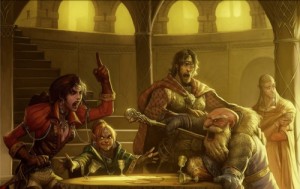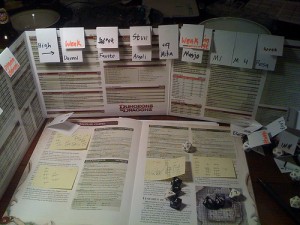On Friday we comb through our extensive archives to find an older article that we feel deserves another look. From January 26, 2011, Dungeon’s Master once again presents: Dealing With Conflict At The Gaming Table.
Mr. Pink: Hey, why am I Mr. Pink?
Joe: Because…
Mr. Pink: Why can’t we pick our own colors?
Joe: No way, no way. Tried it once, doesn’t work. You got four guys all fighting over who’s gonna be Mr. Black, but they don’t know each other, so nobody wants to back down. No way. I pick. You’re Mr. Pink. Be thankful you’re not Mr. Yellow.
Mr. Pink: Mr. Pink sounds kinda wimpy. How ’bout if I’m Mr. Purple? That sounds good to me. I’ll be Mr. Purple.
Joe: You’re not Mr. Purple. Some guy on some other job is Mr. Purple. Your Mr. PINK.
Mr. White: Who cares what your name is?
Mr. Pink: Yeah, that’s easy for your to say, you’re Mr. White. You have a cool-sounding name. Alright look, if it’s no big deal to be Mr. Pink, you wanna trade?
Joe: Hey! NOBODY’S trading with ANYBODY. This ain’t a city council meeting, you know. Now listen up, Mr. Pink. There’s two ways you can go on this job: my way or the highway. Now what’s it gonna be, Mr. Pink?
Mr. Pink: Alright, I’m Mr. Pink. Let’s move on.
Joe: I’ll move on when I feel like it… All you guys got the message?… I’m so mad, hollering at you guys I can hardly talk. Pssh. Let’s go to work.
– Reservoir Dogs


